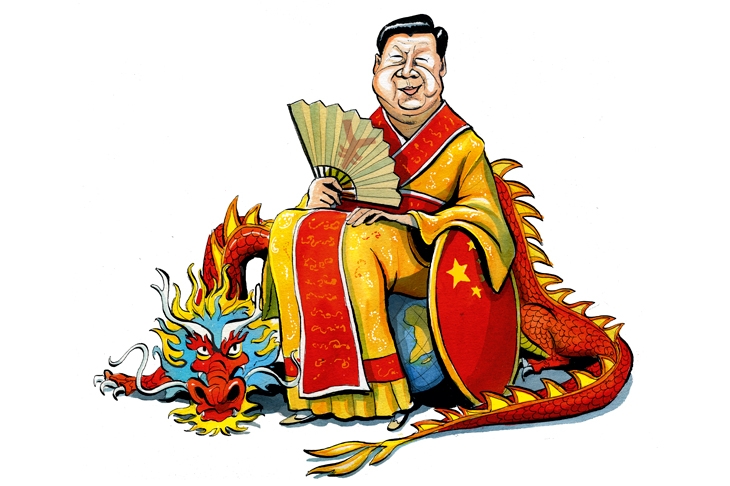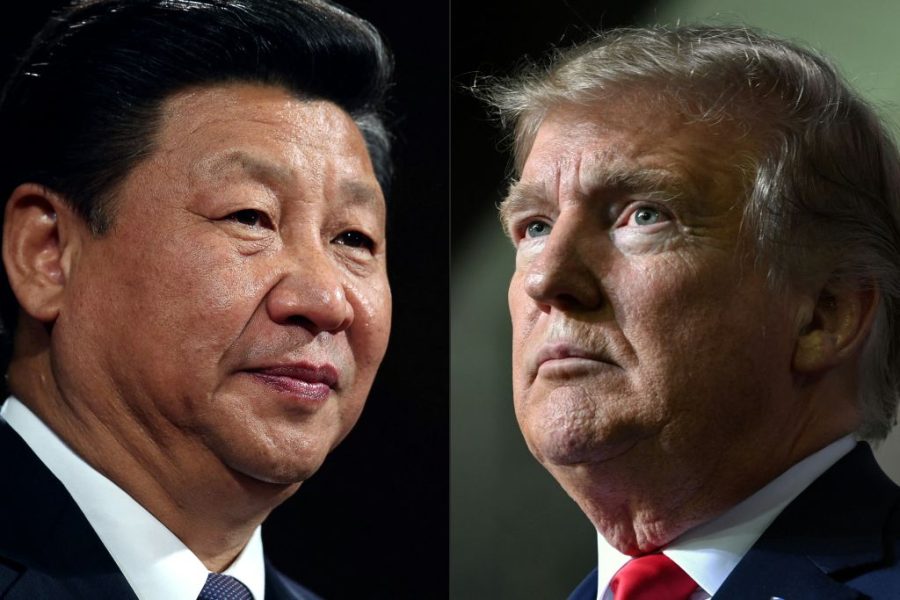In a defiant speech to mark the Communist party’s centenary today, Xi Jinping warned foreign powers they would ‘have their heads bashed bloody against the Great Wall of Steel forged by over 1.4 billion Chinese people’ if they tried to bully China. Beijing would not allow ‘sanctimonious preaching’, he told a carefully vetted crowd in Tiananmen Square, declaring that ‘only socialism can save China’.
At one point military jets flew over forming the number 100 — apparently flown by loyal party members. It was pretty jingoistic stuff, even by Xi’s recent standards, and follows weeks of chest-thumping displays of patriotism under the slogan, ‘follow the party forever’ — though a more appropriate slogan might be ‘follow Xi Jinping forever’.
The party leader has been busy burnishing his revolutionary credentials, visiting sites associated with the Communist party’s victory in the Chinese civil war in 1949. ‘The secret to the success of the Chinese revolution lies in ideals and convictions,’ he said at a memorial park in Guilin. Yet the party has run out of both, and its 100th birthday marks its transformation away from lingering notions of ‘communism’ and into a party of strident ethnic nationalism built around the cult of Xi.
‘The East is rising while the West is declining’ has become a common refrain in the run up to the centenary, with Xi portrayed as a transformative figure, restoring the country’s position as a global power, facing off against a hostile West. His ‘Thought’ has been written into the constitution and elevated beside that of Mao as he maneuvers to stay in power indefinitely.
The party’s ideological emptiness has not discouraged it from encouraging a frenzy of ‘red tourism’, and visitors have flocked to places like Ya’an, which served as a Communist party base until 1948, the year before it seized power. Here they lap up the official version of history, dressing up in Red Army costumes. To keep the narrative from straying, internet police have deleted more than two million posts in the lead-up to the centenary for the crime of ‘historic nihilism’, a term coined for anything that challenges official propaganda (the Cultural Revolution and Great Leap Forward, which costs tens of millions of lives, and Tiananmen Square are completely no-go).
State media refer to Xi as ‘Xi Dada’ — ‘Dada’ means ‘uncle’ or ‘big daddy’, and it seeks to portray him as a man of the people. ‘If you want to marry, marry someone like Xi Dada, a man full of heroism with an unyielding spirit,’ urges a song that went viral on the internet. Online videos instruct people how to dance along. To older Chinese this provokes uncomfortable memories of the personality cult that surrounded Mao — and of the Cultural Revolution when a ‘loyalty dance’ to Mao was sometimes mandatory.
‘Make good use of red resources, inherit red genes and pass on the red country from generation to generation,’ Xi said in a speech published shortly before the centenary, calling for more ideological and moral education for young people. Xi’s ‘Thought’ is now widely studied, a key part of school and university curriculums, yet as an ideology it lacks any real coherence. Its most significant underlying theme is nationalism, with an associated culture of grievance and victimhood — stressing China’s ‘century of humiliation’ and the ‘Chinese Dream’ of restoring its position as a great power. It promotes the party as the embodiment of Chinese tradition, and Xi as an embodiment of the party — a cult of personality not seen since Mao.
COVID-19 triumphalism is another feature of the new nationalism, with Xi as the conquering hero. It has been at the heart of centenary celebrations. Critics have been silenced or subject to online threats and abuse. Novelist Fang Fang, who wrote a moving diary of her experience in Wuhan, has been vilified as a ‘traitor’.
There are no obvious signs of dissent, but that does not mean it does not exist. Last year an audio recording circulated online in which Cai Xia, a former professor at the elite Central Party School, accused Xi of transforming the party into a ‘political zombie’ and of turning China into an ‘enemy of the world’. Xi has launched a sweeping purge of the police and the judiciary, suggesting a significant level of paranoia. There have been dozens of arrests in recent weeks under the guise of his on-going ‘anti-corruption’ crackdown.
Nationalism is not new to the CCP, though before Xi the party drew its legitimacy largely from its ability to deliver stability and economic growth. It kept nationalism carefully in check, turning it on and off as needed. Under Xi it has come to define rule at home and pushiness abroad. Domestically, the CCP has stepped up ‘patriotic education’, and the Sinicization of ‘backward’ ethnic minorities — a policy that has driven the repression of the Uighurs, and which regards any cultural diversity as a threat to be eradicated. Internationally, it is seen in the increasing bellicosity of Chinese diplomats and an assertive foreign policy, intolerant of criticism, and which increasingly defines the West as a rival, or an enemy.
As Xi revels in the adoration of his party on its centenary, Beijing is increasingly blind to the impact of its own imperial behavior and the extent to which it is generating global concern.
This article was originally published on The Spectator’s UK website.

























